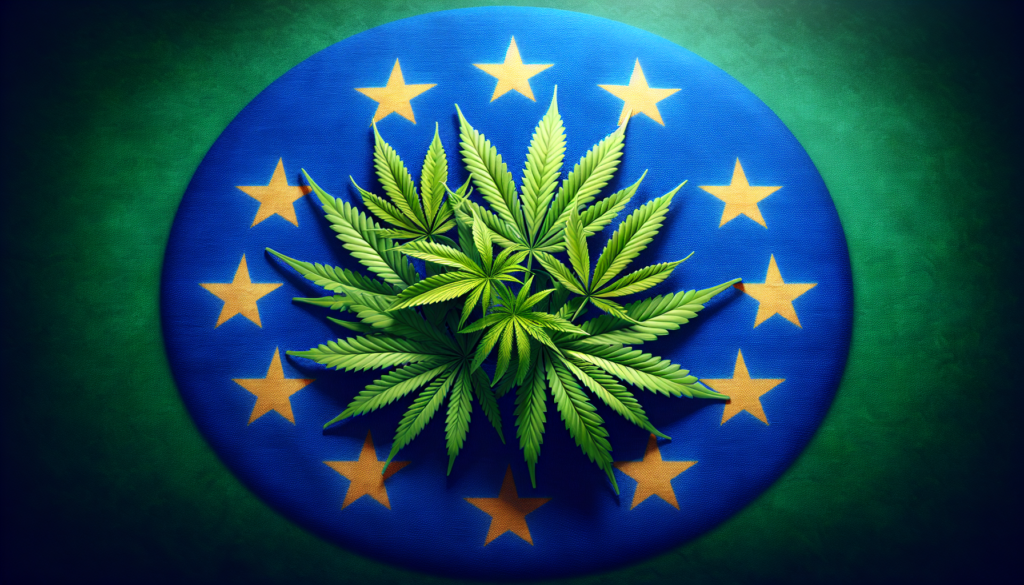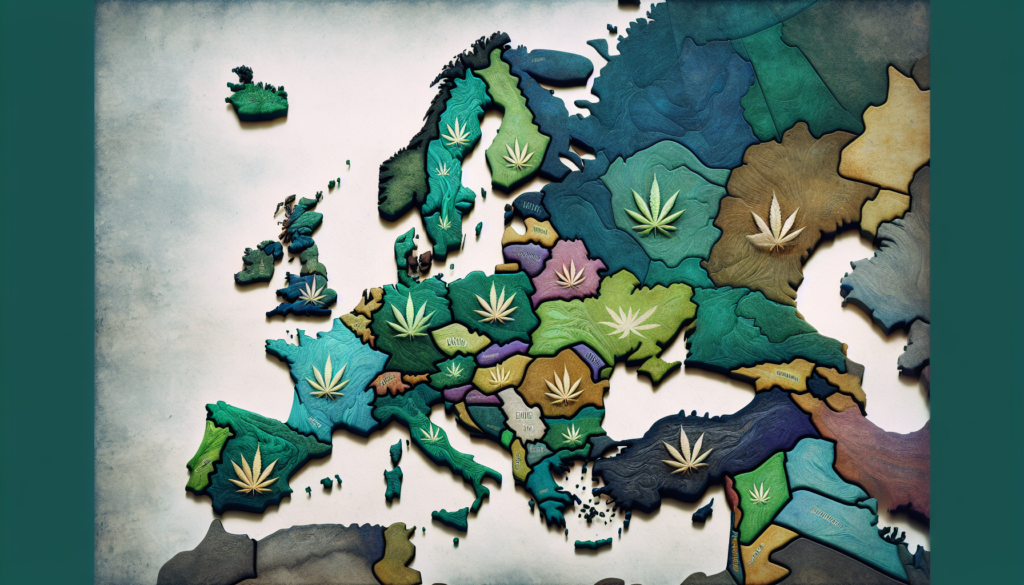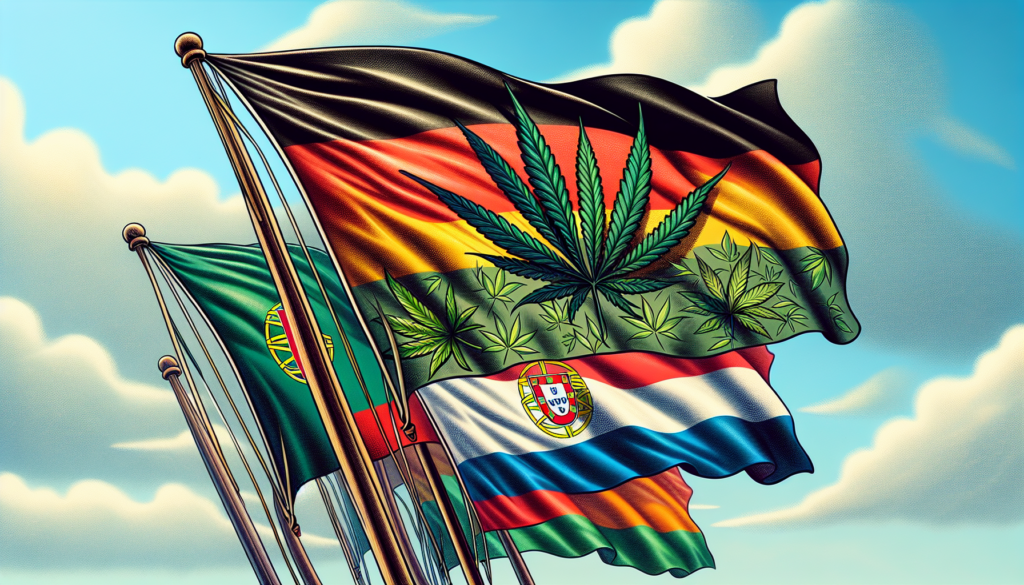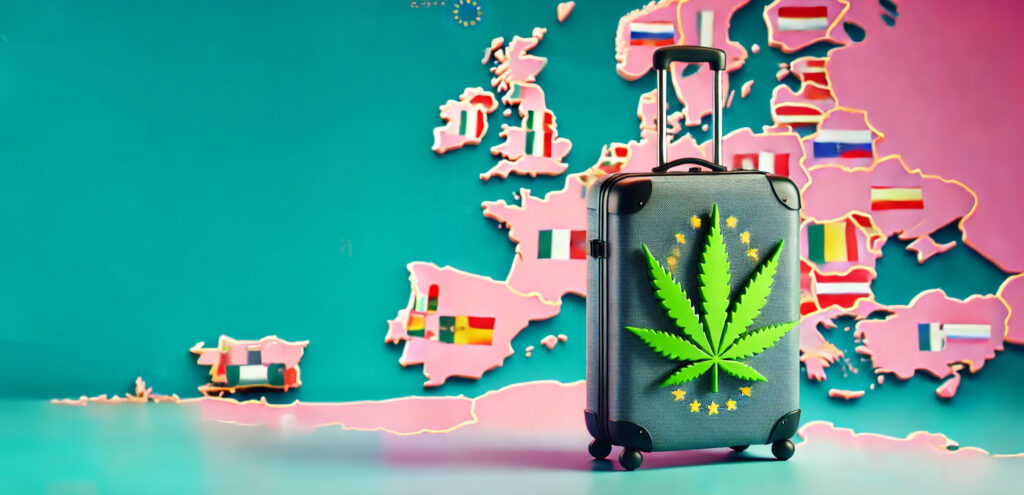What is the status of cannabis legalization in the EU? Countries such as Germany, Spain and the Netherlands already have regulations on the legalization of cannabis. This article provides an overview of the current laws and challenges in the EU. He also sheds light on the special features of medical travel with cannabis within Europe and explains which regulations patients must observe.
The most important facts at a glance
- From April 1, 2024, Germany will allow the private cultivation of up to three cannabis plants and communal cultivation for personal consumption.
- Legalization varies widely across the EU: Spain and the Netherlands have made progress, but sale and trade are banned at EU level.
- The legalization of cannabis promises significant tax revenues and new jobs, as studies in Germany show. This could promote economic growth and new business opportunities in the EU.
- Patients who require medicinal cannabis must observe country-specific regulations and necessary documents such as a medical certificate when traveling in the EU. This ensures the legal transportation of your medicinal cannabis across borders and avoids legal problems.
Cannabis legalization EU: What you need to know

The legalization of cannabis in the EU is a complex issue with many facets. In Germany, for example, the law on the controlled use of cannabis came into force on April 1, 2024. This law allows adults to privately grow up to three cannabis plants for their own consumption and to cultivate them collectively, non-commercially in so-called cultivation associations. With these regulations, the federal government is attempting to curb the illegal market and control the quality of cannabis.
But Germany is not the only country in the EU that is making progress. Countries such as Spain and the Netherlands have also taken significant steps to facilitate access to cannabis. Spain has allowed the use of cannabis for medical purposes since 2022 and has cannabis social clubs for recreational use. In the Netherlands, cannabis has been de facto decriminalized since 1976, and licensed coffee shops are allowed to sell small amounts of cannabis.
Legalization: pro or con?
The question of whether cannabis should be legalized is one that concerns many people. Some see legalization as a way to dry up the black market and ease the burden on the legal system. Others fear that legalization could send the wrong signal about the acceptance of drugs in society.
The Greens in the European Parliament have been campaigning for the legalization of cannabis for private use throughout the EU for years. However, despite these efforts, the legal situation at EU level remains clearly against the sale and trade of cannabis. In this blog post, we will therefore also examine the different approaches of the member states and shed light on the different perspectives.
The status quo of cannabis legalization in the EU

The current status of cannabis legalization in the EU varies greatly from country to country. In Germany, the law, which came into force on April 1, 2024, allows private home cultivation of cannabis and communal cultivation in cultivation associations. These regulations are intended to help curb the illegal market and control the quality of cannabis.
In Spain, cannabis has been legal for medicinal purposes since 2022, and there are cannabis social clubs for recreational use. The Netherlands has been a pioneer in the decriminalization of cannabis since 1976 and allows its sale in licensed coffeeshops. Despite this progress, the sale and trade remains prohibited at EU level.
Medical cannabis vs. recreational cannabis
Medical cannabis and recreational cannabis differ not only in their use, but also in the legal regulations. Medical cannabis is prescribed to relieve specific symptoms such as pain or spasticity and often requires a doctor’s prescription and special authorizations. Several European countries allow doctors to prescribe medicinal cannabis to treat certain health conditions.
Recreational cannabis, on the other hand, is mainly consumed for recreational or psychoactive effects and is still illegal in many countries. In Germany, for example, adults are allowed to grow up to three cannabis plants privately, but public consumption is severely restricted.
Countries with progress in cannabis legalization

Some countries in the EU, such as Malta, the Netherlands, Norway and Austria, have made significant progress in legalizing cannabis. Germany, the Netherlands and Portugal are pioneers in this area. The Netherlands, Norway, Austria and Poland have different approaches to regulating cannabis.
- Germany allows private and communal cultivation.
- The Netherlands has had a policy of toleration for decades.
- Portugal has decriminalized the possession of small quantities of all drugs.
Netherlands
The Netherlands has been a pioneer in the legalization of cannabis since 1976, although cultivation and wholesale are still illegal. Since the mid-1980s, licensed retailers (coffee shops) have been allowed to sell small amounts of cannabis under the Gedogen policy. These coffee shops are known worldwide and attract millions of tourists every year who want to take advantage of the country’s liberal cannabis laws.
Through an experiment with regulated cannabis, the Dutch government wants to solve the paradox of front door and back door, where coffee shops are allowed to sell cannabis legally but have no legal source of supply. This experiment could lead the way for other EU countries that have similar problems.
Portugal
Portugal decriminalized the consumption and possession of small quantities of all drugs, including cannabis, in 2001. This bold decision has led to a reduction in drug-related deaths and infections and shows that a progressive drug policy can have a positive impact.
In contrast to many other countries, drug use in Portugal is seen as a health problem and not a criminal one.
Germany
With the planned partial legalization of cannabis, Germany is forging ahead in Europe, while Europe-wide legalization remains controversial. From April 1, 2024, adults will be allowed to grow up to three cannabis plants privately, and from July 1, 2024, non-commercial associations will be allowed to grow cannabis and distribute it to adults.
In addition, up to 50 grams of cannabis may be stored in private rooms. However, there are important restrictions on consumption, such as the ban on consumption in the vicinity of schools, kindergartens and other facilities for children and young people.
Challenges and obstacles to legalization
The legalization of cannabis in the EU faces numerous challenges and obstacles. These range from legal hurdles to political resistance.
Although some countries tolerate consumption, Europe-wide legalization remains controversial.
Legal hurdles
The sale of drugs, including cannabis, is prohibited throughout the EU. The EU has clear regulations against the cultivation, sale and cross-border trade of cannabis. These legal hurdles make it difficult to establish a uniform cannabis policy in the EU. In Germany, for example, the public consumption of cannabis is prohibited in certain areas and at certain times.
The Netherlands has announced an experiment in which 10 licensed producers are to grow regulated cannabis for coffee shops. This experiment could serve as a model for other EU countries wishing to overcome similar legal hurdles.
Political resistance
Political resistance to the legalization of cannabis is strong in many EU countries. Proponents such as the Greens in the European Parliament argue that legalization would dry up the black market. However, many Eastern European countries and Scandinavia remain sceptical about legalization.
In France, despite high consumption, President Emmanuel Macron is strictly opposed to legalization. Many fear that legalizing cannabis could send the wrong message about the acceptance of drugs in society, especially when looking at other countries such as France, Greece, Iceland and Italy that are also facing this issue.
Effects of legalization on patients

For patients who use medical cannabis, legalization could bring significant benefits. You could import or export the medicinal cannabis prescribed as part of a therapy in the appropriate quantity for the duration of the trip as a travel requirement. However, there are also specific regulations for traveling with medical cannabis and taking it with you on trips.
Access to medicinal cannabis
The attending physician may only prescribe narcotics listed in Annex III of the Narcotics Act (BtMG) for medical purposes in accordance with the Narcotics Prescription Regulations. No other substances may be prescribed. In Portugal, for example, medicinal cannabis has been legal since 2018, but there are only two approved medicines: Sativex and THC flowers from Tilray. Some European countries allow medical cannabis to be brought in from Germany if it is a legitimate medicine.
Access to medicinal cannabis varies greatly from country to country. While some countries make access easier, others have strict regulations. It is important to find out about the specific legal regulations of the destination country before traveling abroad.
Travel supplies and take-away
A notarized certificate is required to take medical cannabis with you when travelling. Within the Schengen area, travelers require a Schengen form, which is a ‘Certificate for the carriage of narcotics in the context of medical treatment’ in accordance with Article 75 of the Schengen Convention. This certificate must correspond to the days of travel and is valid for a maximum of 30 days, depending on the duration of the trip.
Traveling abroad, especially outside the Schengen Agreement, is very popular during the vacation season. Patients should therefore inform themselves in advance about the specific regulations of the destination country and carry a multilingual certificate from a doctor that is certified by the national health authority. Some countries prohibit the carrying of certain substitution substances or impose special conditions on the patient.
Schengen area
The Schengen zone has evolved in 2024 and now comprises 29 countries, including Bulgaria and Romania, which joined the zone on March 31, 2024. The current member countries are:
- Belgium
- Bulgaria
- Denmark
- Germany
- Estonia
- Finland
- France
- Greece
- Iceland
- Italy
- Croatia
- Latvia
- Lichtenstein
- Lithuania
- Luxembourg
- Malta
- Netherlands
- Norway
- Austria
- Poland
- Portugal
- Romania
- Sweden
- Switzerland
- Slovakia
- Slovenia
- Spain
- Czech Republic
- Hungary
Economic aspects of cannabis legalization

The economic aspects of cannabis legalization are promising. Legalization can make a significant contribution to economic development by creating new jobs and diversifying agriculture.
In addition, the overall economic costs caused by drug use could be reduced, in particular by reducing health-related damage.
Market potential
By 2025, the European cannabis market is estimated to have a turnover of several billion euros. Global sales in the cannabis market are expected to rise to 40 billion dollars by 2026, signaling strong market growth. Cannabis legalization could create around 27,600 full-time equivalent jobs, particularly in the area of btm products.
The market for cannabis products is already showing changes, such as an increase in potency and a reduction in the price of herbal cannabis in recent years. Interestingly, the medical cannabis market is growing faster than the recreational cannabis market, indicating the increasing acceptance and need for medical applications.
Taxable income
The legalization of cannabis could generate billions in tax revenue for EU states every year. Haucap and Knoke (2021) estimate the tax revenue and costs saved by legalizing cannabis in Germany at around 4.7 billion euros. The expected tax revenue from cannabis legalization in Germany amounts to 2.8 billion euros annually.
Legalization of cannabis has led to the creation of new jobs and tax revenues in many countries. A third of those surveyed hope that legalization will curb the black market for cannabis, as it will be easier to control.
International perspectives
The legalization of cannabis is handled differently in different countries around the world, which opens up interesting international perspectives.
In Thailand, cannabis was legalized for industrial and medical use in 2022. This legalization aims to support the economy, which has been weakened by the pandemic.
Comparison with non-EU countries
In the USA, cannabis is legalized in 22 states, giving 158 million people access. Canada fully legalized cannabis in 2018, which led to sales of 3.6 billion euros in 2023. In these countries, cannabis has been legalized for both medicinal and recreational use, which has so far only been partially implemented in the EU.
The USA and Canada have shown that the legalization of cannabis can lead to a reduction in drug-related crime and better control of product quality. In Colorado, which has legalized cannabis since 2014, there are official statistics on consumption patterns and annual sales volumes. A US study found that in states with legalized cannabis:
- The number of robberies fell by 26 percent,
- The number of drug offenses fell,
- The quality and safety of the products could be better controlled.
These results show that the legalization of cannabis can have positive effects.
Influence of global trends
The global trends towards cannabis legalization, particularly in North America, have strongly influenced the debate in the EU. The legalization movement in North America has drawn attention to the possible legalization of cannabis in the EU. This movement has opened up new legal and social perspectives in the EU.
The positive experiences in countries such as Canada and the USA could serve as a model for EU countries that are considering similar steps towards legalization. It will be interesting to see how the global legalization movement develops and what impact it will have on the EU.
Summary
The legalization of cannabis in the EU is a complex issue that encompasses numerous aspects. From the legal framework and political resistance to the economic impact and the challenges for patients – the debate is lively and complex. Germany, the Netherlands and Portugal are examples of countries that have already made significant progress.
In summary, the legalization of cannabis not only poses legal and political challenges, but can also offer significant economic benefits and improvements for patients. The global trends towards legalization could further drive the debate in the EU and open up new perspectives. It remains to be seen how the legalization of cannabis will develop in the EU.
Frequently asked questions
No, the sale of cannabis is prohibited throughout the EU, although some countries tolerate small amounts for personal use. It is important to find out about the laws and regulations in each country in order to avoid legal problems.
The German law on the controlled handling of cannabis came into force on April 1, 2024, with additional regulations from July 1, 2024.
Germany, the Netherlands and Portugal have made significant progress in legalizing cannabis.
The main difference lies in the use: Medical cannabis is prescribed for symptom relief, while recreational cannabis is used for recreational purposes and is often still illegal in the EU.
It is important to have a notarized certificate, a so-called Schengen form, for carrying medical cannabis when travelling, as the regulations may vary depending on the destination country. You should therefore inform yourself in advance about the regulations when traveling abroad.


